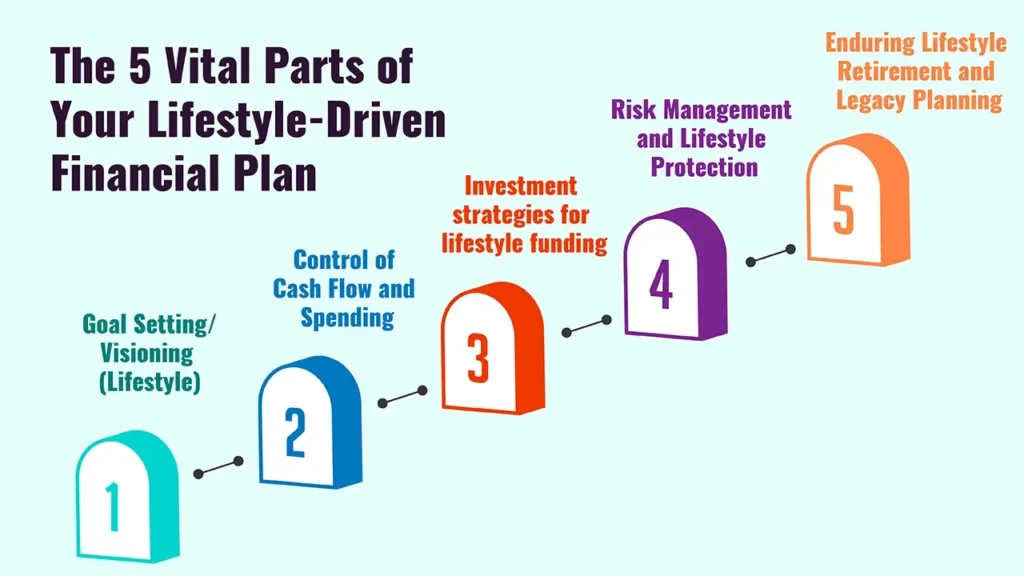Do your financial decisions truly reflect the kind of life you want to lead, or are they merely a series of impulsive purchases? The idea of “lifestyle-based financial planning” is that your money ought to reflect your deepest values and aspirations.
You will learn the meaning and power of becoming an optimal receiver using the same principles that the universe uses to sustain and grow everything. In this thorough guide you will see how to lay a financial roadmap that is perfectly designed to support your lifestyle, whether that includes daily expenses or long-term dreams.
1. What is lifestyle financial planning? (Understanding the Core Concept)
Money Is Just a Number: Finding the Purpose in Your Financial Life
- Key Concept: Lifestyle-based financial planning: A planning strategy that puts clients at the center and involves all aspects of their life and views financial planning as an integrated part of the whole plan rather than a set of products or investments.
- Differences From Traditional Planning: Traditional planning begins with assets and returns; lifestyle planning begins with you and your ideal life.
- Focus: Not just how to build wealth, but how to leverage it in leading a fulfilling life now and in the future.
Focus: Not just how to build wealth, but how to leverage it in leading a fulfilling life now and in the future. For a comparison of Traditional financial adviser versus lifestyle financial planning.
2. Why is Lifestyle-Based Financial Planning Essential Today?
Advantages of Having a Lifestyle-Based Financial Plan
- Clarity and Motivation: Offers a clear sense of “why” behind financial moves which allows for a more purposeful approach to saving and investing.
- Less Stress: Money is a tool, not a stress; it can work in harmony with your life plans.
- Prevents Financial Regrets: Stops misbinary spending or lets go of opportunities.
- More Fulfilment: Makes sure that financial decisions add to a happier and more meaningful existence.
- Smarter Decision Making: Every financial decision is measured against your lifestyle goals.
- Long-Term Vision: Promotes an integrated approach to financial well-being, from daily habit to embodiment planning.
3. The 5 Vital Parts of Your Lifestyle-Driven Financial Plan

1. Goal Setting/Visioning (Lifestyle)
Detail: Expressing your perfect day, year, and life is key to this.
Practical Advice: Make a list of what type of experience you would like, what type of hobbies and travel you enjoy, where you would want to live, what type of work balance and charitable giving you want, and what type of family focus you want. Try and put a figure on these.
2. Control of Cash Flow and Spending
Detail: It’s critical to track your daily income & expenses to align them with your lifestyle’s preferences.
Practical Advice: Develop a “values-based budget,” spot discretionary spending that’s inconsistent with goals, and manage cash flow to cover desired experiences.
3. Investment strategies for lifestyle funding
Detail: You also want to create an investment portfolio for funding a lifestyle at various stages of life.
Practical Advice: Make sure long-term investments support future lifestyles (like retirement), diversify your investments, and create targeted savings accounts for short-term lifestyle goals (like a travel fund or sabbatical fund).
4. Risk Management and Lifestyle Protection
Detail: Protection against the unexpected, ensuring that you can live your ideal lifestyle.
Practical Advice: To safeguard income, assets, and general well-being from unforeseen circumstances, have adequate health, disability, life, and property and casualty insurance.
5. Enduring Lifestyle Retirement and Legacy Planning
Details: Planning for your future lifestyle and your legacy matters when it comes to retirement.
Practical Advice: Project retirement expenses based on desired activities, optimize retirement savings, and create an estate plan that reflects your values and supports future generations or causes.
4. Building Your Lifestyle-Based Financial Plan
From Vision to Execution, Step by Step
- Discovery and Reflection: Values, passions, and life goals discovery and exploration (with the planner’s help).
- Present Financial Picture: Do an overall analysis of income, expenses, assets, liabilities and what has already been done.
- Gap Analysis & Prioritization: Determine where existing finances do not meet lifestyle objectives and prioritize what is most important.
- Strategy Creation: Develop unique financial strategies for all those pieces (investing, saving, debts, etc.) that honed in on the vision of a lifestyle.
- Implementation: Implement the plan (open accounts, change spending, invest money).
- Continual Monitoring and Flexibility: You should periodically revisit the plan, celebrate successes, and adapt to life, goals, or market conditions.
5: The Most Common Mistakes in Lifestyle-Based Financial Planning
Keeping Your Lifestyle Plan on Track
- Undefined Goals: Not specifying what the lifestyle you seek looks like.
- Ignoring reality: Believing you can earn a certain amount of income, that expenses will be this, or that investment will return that.
- Lack of Discipline: That means not following your budget or savings plan.
- Failure to Review Regularly: Letting the plan gather dust.
- Fear of Change: Refusing to modify your plan when life serves up a curveball.
- Comparing to Others: Concern with external validation.
Conclusion
“If I may use a phrase, lifestyle-based financial planning is client-focused, holistic, and iterative—neither more nor less.” It’s more than the process of getting rich; it’s designing a life to include a rich life that reflects who you are and what’s most important to you. Begin living your most financially fulfilling life today!
Call to Action
Encourage readers to begin identifying their lifestyle goals and consider how a financial plan built around those goals can transform their financial future.
Frequently Asked Questions
1. What is lifestyle-based financial planning, and how does it differ from traditional financial planning?
Traditional financial planning begins with your assets and seeks for you to maximise your returns. Lifestyle planning starts with your life, values and goals and then works the other way to create a financial plan that supports that vision, which is a much more comprehensive and meaningful way to plan for your future.
2. Is lifestyle-based financial planning the exclusive preserve of the rich?
No, it’s for everybody, regardless of how much money they have. The fundamental basis of matching money with values is truly transcendent.
Although the plans and complexities vary, all will benefit from making a mindful financial decision that’ll help you sustain the lifestyle you want.
What will a financial planner do to assist with lifestyle-based planning?
A financial planner who serves clients using this modality acts as a facilitator who assists you with verbalising your lifestyle goals, articulating their cost in human terms, building a customised financial plan designed to accomplish them, and, in some sense, holding you accountable.
Backed by decades of experience, they offer comprehensive services in investments, tax, and risk management, tailored to your specific needs.

Leave a Reply